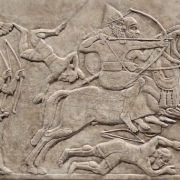Löwen des Gerichts
Aber der König von Assyrien ließ Leute aus Babel und aus Kuta, aus Awa, Hamat und Sepharwajim kommen und siedelte sie an Stelle der Kinder Israels in den Städten Samarias an. Und sie nahmen Samaria in Besitz und wohnten in dessen Städten.
Und es geschah, als sie zu Anfang ihrer Niederlassung dort den Herrn nicht fürchteten, da sandte der Herr Löwen unter sie; die richteten Verheerungen unter ihnen an. (2. Könige 17,24-25)
Das Königreich Israel, die zehn nördlichen Stämme, waren besiegt. Die brutale assyrische Armee hatte sie geschlagen und dann das Volk gezwungen, sich an verschiedenen Orten des Assyrischen Reichs anzusiedeln. Und dann ließ der König von Assyrien Leute ins Land kommen. Die Politik der Assyrer war, rebellische und widerspenstige Leute zu entfernen und deren Land mit Menschen aus anderen Teilen des Reiches zu besiedeln.

Dadurch, so hofften die Könige von Assyrien, sollten die eroberten Länder von Menschen bewohnt werden, die vorher keine Verbindung dazu gehabt hatten. Sie wollten, dass die Menschen im Reich nur eine Verbindung zum König von Assyrien hatten und diesem loyal ergeben waren.
Doch unser Bibeltext hier erzählt uns etwas über diese neuen Leute, die ins Land kamen: Und es geschah, als sie zu Anfang ihrer Niederlassung dort den Herrn nicht fürchteten, da sandte der Herr Löwen unter sie. Als die Israeliten besiegt waren und das Land nicht verteidigen konnten, hat Gott es auf übernatürliche Weise verteidigt – und zwar sandte der Herr Löwen unter sie!
Dies zeigt, dass nicht nur das Reich Israel etwas Besonderes war, sondern auch das Land Israel. Gott forderte, dass Er von den Menschen im Land gefürchtet würde, auch wenn sie aus anderen Nationen stammten.
Sacharja 2,12 sagt uns, dass das Land Israel ein Heiliges Land ist. Gott sieht es als etwas Besonderes an, und Er wird die zur Verantwortung ziehen, die darin leben und Ihn nicht fürchten.
In 2. Könige 17 lesen wir weiter, dass die Assyrer verstanden, dass die Löwen kamen, weil sie den Gott Israels nicht ehrten. Es ist erstaunlich, dass die Assyrer anscheinend wussten, was das Volk des gerade eroberten Reiches Israel nicht wussten – dass sie den Gott Israels ehren mussten. Sie ließen sogar einen Priester aus Israel kommen um sie die Furcht des HERRN zu lehren (2. Könige 17,28).
Man kann sagen, so wie Charles Spurgeon es tat, dass sie „von Löwen bekehrt“ wurden. Doch 2. Könige 17,29-33 erklärt, es war nicht wirklich eine Bekehrung. Sie ehrten weiterhin ihre heidnischen Götter neben dem Gott Israels.
Wenn man zu Gott kommt, nur weil man Angst vor dem Gericht – vor den Löwen – hat, ist niemals genug. Es kann ein guter Anfang sein, doch es darf damit nicht aufhören. Wir müssen zu Gott kommen und unser Vertrauen auf Seine Liebe für uns in Jesus Christus setzen. Es ist die Güte und Freundlichkeit Gottes, die uns zur Buße führt (Römer 2,4).










